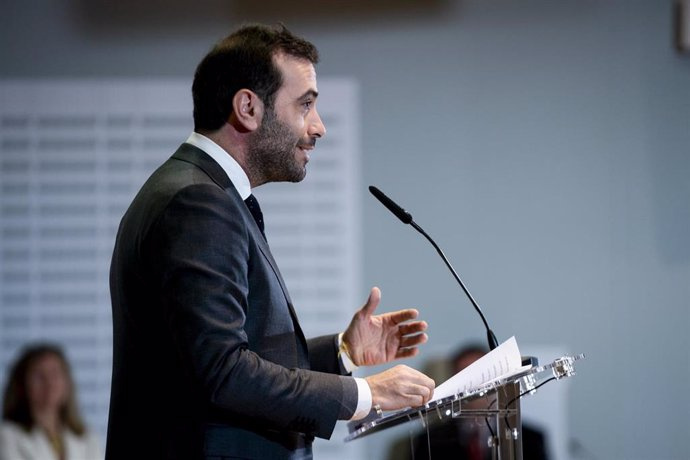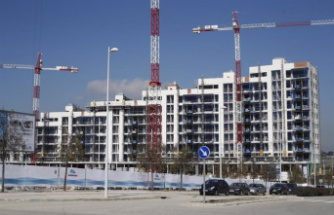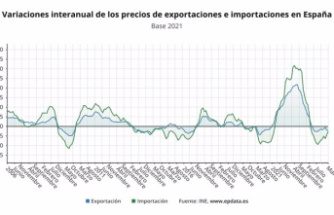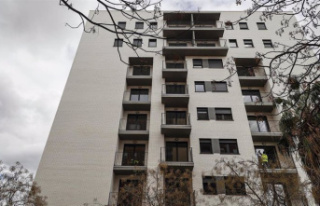MADRID, 15 Abr. (EUROPA PRESS) -
The Minister of Economy, Commerce and Business, Carlos Body, has been in favor of adjusting and adapting the tax on financial entities, if made permanent, to some fundamental elements of economic policy such as the evolution of the interest rate cycle. interest or other objectives such as promoting loans to SMEs.
Regarding temporary taxes on banking and energy, Corpus has highlighted that their implementation has been "a success" because it has contributed to these two sectors contributing more fairly to the financing of the social shield and it has also been made without harming its solvency.
The Government had already expressed its intention to modify the energy tax to make it permanent, introducing the possibility that companies can deduct strategic investments linked to industrial projects and the decarbonization of the country's productive system.
Regarding the formula to adapt and make the banking tax permanent, the Government had not yet made a statement but the governor of the Bank of Spain, Pablo Hernández de Cos, had already requested that the tax be used to generate an incentive that increases the solvency of the entities, as has been done in the Italian case.
Now, the minister has opened the door to the possibility of adapting the tax on financial entities if it is decided to make it permanent to some fundamental elements of economic policy such as the evolution of the interest rate cycle or other objectives such as may be to promote loans to SMEs.
"We are making an assessment of the different needs and the potential adjustment if this tax is made permanent so that we can take full advantage of its potential with a balanced approach with respect to the sectors," said Body.
In his speech, the minister expressed his strongest condemnation of Iran's attacks on Israel that occurred this weekend. "Not only do we view these events with enormous concern, but we maintain a firm commitment and commitment to peace and respect for international humanitarian law," he stressed.
The minister believes that, in part, the markets had anticipated this weekend situation, because at the end of last week a certain increase in oil prices was perceived. "In fact, they have reacted, in some ways, slightly downward this morning," he noted.
For Corps, this is a sign of a certain calm in the face of the reaction of the main international leaders, who have expressed their will to avoid any escalation of the conflict in the region.
In that sense, from the point of view of the Government of Spain, the minister has assured that continuous follow-up and monitoring will be carried out.
In its latest report, the International Monetary Fund (IMF) has insisted to Spain in its latest report on the need to carefully evaluate the effects of additional increases in the minimum wage or reduction of the working day.
Body has pointed out that elements as important as the reduction of working hours, "which is an unavoidable debate in the economy", require a framework of social dialogue and flexibility, to take advantage of all the positive effects that it entails and minimize the potential negative effects. .
The minister has also referred to the "positive" results of the increase in the Minimum Interprofessional Wage (SMI), which have exceeded "expectations and in many cases, also criticism."
What is observed, according to Body, is that the salary improvement in that lower part of the income distribution has made it possible to reduce inequality and has particularly benefited women and young people.
Furthermore, this is contributing positively to the country's economic growth, consumption and internal demand, while its impact on employment has been "very marginal", a fact that is far from the "catastrophic" reports that predicted a debacle in terms of the labor market when these minimum wage increases began to converge with 60% of the average wage.
In any case, the minister has opted to maintain this long-term perspective, to eliminate obstacles to growth, boost productivity, demographics, the growth of companies and eliminate short and medium-term frictions such as imbalances in three major areas: the labor market, the educational field and the housing field.
Regarding housing, Body believes that "bold and ambitious" steps must continue to be taken. "We have a lot at stake on this issue," the minister warned, after warning of the "enormous social repercussions" of not facing this issue.
Thus, Corpus believes that the challenge of affordable access to housing for citizens must be resolved and that is why the Government is working on a "country alliance" with measures aimed at alleviating the different bottlenecks, both on the demand side and also and especially on the supply side.
"We have to respond to this problem that is key above all for the emancipation of our young people, which is one of the great challenges in the next decade," stressed the head of Economy.
Regarding the political situation in the country, Corpus has defended the need to negotiate and agree on projects and regulatory reforms, something that, in his opinion, "does not have to have any negative connotation, but quite the opposite."
"In fact, legislative projects, and what goes through social dialogue, are those that are most sustainable, which are normally the ones that last in the long term," he emphasized.
Prior to the intervention of Carlos Body, the former Minister of Economy in the governments of Felipe González, Carlos Solchaga, pointed out that at this time there is no alternative to coalition governments, with the difficulties that they represent.
Furthermore, he has warned that this Government not only needs the coalition for its mandate, but also requires external support in Parliament. "Support that political groups are going to provide to the Government that we know is not precisely the well-being of our nation the first of their concerns," he warned.
That is why it is not strange, according to Solchaga, that the International Monetary Fund has warned Spain that the political climate may not help this process and this economic recovery policy that is essential at this time in this country.
Asked about the upcoming replacement of the governor of the Bank of Spain, Pablo Hernández de Cos, Corpus pointed out that it is a process for which there are still two and a half months left, so "it is not something that is particularly urgent."
Despite this, the minister has assured that the person who replaces Hernández de Cos will meet the two main characteristics that the current governor has: Enormous professional training and an impeccable resume. "In that sense, convey peace of mind because there are excellent candidates," said Body.













